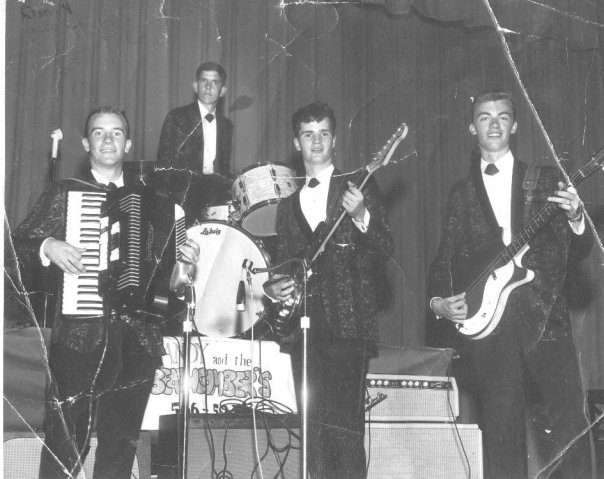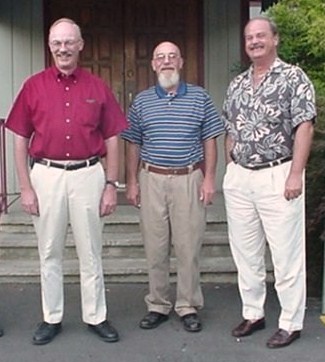
Mustangs - Found and RediscoveredSucess Realized 45 Years Laterfeature article by John TimmonsMany months ago, I wrote an article entitled, "Help Solve A 60s Rock Group Mystery" (Who Were The Mustangs), humbly asking for anyones help in providing information about this 1960s instrumental rock group that had a hit single, "The Dartell Stomp" to which I was very fond. Unfortunately, there was not one response. Coupled with no replies was the fact that I had invested some 12-14 hours of research into finding out who this group was, but with no results. I had just about given up hope of ever learning when one day recently, I discovered a clue on YouTube and "the rest is history" as the saying goes. The mystery has been solved while The Mustangs have been rediscovered by '60s instrumental rock music afficionados through the popular website where "The Dartell Stomp" can now be heard once again. But perhaps the biggest news is for the four original members of the band itself. For the past 45 years, The Mustangs had absolutely no idea how successful their single became, charting to #92 on the Billboard Hot 100 Chart and in the Top 20 on many rock and roll radio station record surveys from coast to coast. This would all change with the writing of this biography in November 2009. The bandmates, now all in their early sixties, have learned through additional new research just how popular their hit record had been on the national rock scene in 1964. Here is the previously unknown, untold, complex, and intriguing biography of The Mustangs. The story of The Mustangs begins in 1959 when 12 year old John Beach and schoolmate, Tommy Wright compete in a grammar school talent contest. The boys did not win the contest, but it did provide them with the idea and impetus to form their own band. Beach played guitar and Wright bass. By late 1961, two other 13-year-olds joined Beach and Wright to start a band. Paul Amadio played drums and Jack Fernandez was a keyboardist, playing a Cordovox. This was the beginning of Sandy and The Beachcombers. The four young teens from New Jersey did surprisingly well, playing 3-4 days a week and earning good money for the time. Then in 1963, a simple change in where the band practiced would lead to the realization of every teenage musicians hope in the 1960s..... signing a professional recording contract. The band always rehearsed at the home of John Beach, but for whatever reason, the group decided this one day to practice in the garage of drummer Paul Amadio, a common place to play during this era. Coincidently, an editor for Billboard Magazine lived just two doors away and heard the band practicing on the warm summer day. He came down and told the boys that they sounded good and asked them if they would be interested in playing a song for a record company in New York City. The editor told them that Providence Records was in need of a group to play "The Dartell Stomp", a song previously recorded on the Bolo Label by a band called The Viceroys. Bolo went out of business and Providence acquired the rights to the song. The boys, who were now all sixteen, jumped at the opportunity and met with the owners of Providence along with their fathers who accompanied them to the big city. Providence offered them a one year recording contract which was a huge thrill for the teens. Though there was no money involved at the signing, the group was told that they would receive royalties depending on how many records sold, although no specific sales numbers were ever mentioned. The boys agreed to the contract, however, due to their age, had to have their fathers actually sign the document.
The Mustangs, after recording "The Dartell Stomp", consisted of Tom Wilson (Cordavox), John Beach (Lead Guitar & Co-Founder), Tom Wright (Bass & Co-Founder), and Jack Hunt (Drums). B each and Wright both played on the recording of "The Dartell" The Dartell Stomp on You Tube: https://www.youtube.com/watch?v=A7E86pd4ih0 For some unknown reason, there was an urgency by the label for the teens to record "Dartell". The group took three days off from school in late 1963 to practice the song and on day three, record it. Providence decided to use a previously taped instrumental of the boys called "Lazy Love" as the "B Side" despite the objections of the teens who requested that their song "Thunder" be used. "Thunder" started out with a loud thunder-like sound created by tipping over a reverb amplifier, something that scared Providence executives who did not like the loud sound nor the piece. It would be several months later in March or April of 1964 that "The Dartell Stomp" would
officially be released. At the time, the band members all thought this was a "one shot dream" and truly believed the record had no chance of ever becoming a hit. And according to John Beach, "I didn't like the song, personally. There was too much repetition. We tried to get them to do a guitar riff, but to no avail". Interestingly, the record label told the group prior to recording that they would have to record the song under a different name - The Mustangs, not as Sandy and The Beachcombers. It is purely conjecture, but a possible explanation for the name change might have been an attempt to associate the group/record with the introduction of the new Ford Mustang that was first shown at the Watkins Glen Sppeedway in October 1963, the approximate same time that "The Dartell Stomp" was recorded. Following this appearance, the Mustang was then seen by thousands at the New York Worlds Fair on April 17, 1964. Some 22,000 Mustangs were sold alone on the first day of sales and one million within the first 24 months of its existence. Amazingly, "The Dartell Stomp" soon thereafter began climbing up the rock and roll Top 40 charts starting in June 1964 and continuing through September. Was the band name and release date of "The Dartell Stomp" something that was carefully calculated to ride on the extraordinary sales wave of the new Ford model in an attempt to maximize sales, or purely coincidental? This is something that may never be known. Life for the young men continued on as it had been before recording "Dartell" with no performance changes, but there were two personnel changes in the band. Paul and Jack left the group and were replaced by Jack Hunt on drums and Tom Wilson on the Cordovox. The half new, half original group thought "it would be suicide" to change their name to The Mustangs, in effect having to start over in terms of name recognition. The band continued playing gigs as Sandy and The Beachcombers and consciously made a decision to play 3-4 days a week as before with the financial benefit of this schedule outweighing other alternatives. The band would perform at weddings, parties and other social events while also becoming the House Band at two area restaurants. The group also performed at The Hazlet Fair and soon thereafter teamed up with the amusement company to play for two summers wherever the company was operating throughout New York and New Jersey. All the while, there was no knowledge or realization by the band that "The Dartell Stomp" had made its way onto The Billboard Hot 100 Chart, peaking at #92, and that the instrumental single was a hit throughout many parts of the country. Some examples of the records popularity based on sales are reflected on such major rock and roll radio stations weekly surveys as: WLS (Chicago): #13 for the week ending August 21 KQV (Pittsburgh): #6 for the week of July 22 WARM (Wilkes-Barre): #20 for the week ending August 21 WKNR (Detroit): #14 for the week of September 17 WXYZ (Detroit): #20 for the week of September 15 WENE (Endicott, NY) #10 for the week ending October 3 KEWB (San Francisco) #39 for the week ending October 30 Sandy and The Beachcombers continued to perform unitl 1970 when they decided to finally call it quits after nine years of performing. Each of the original members of the band went on to have successful careers in various fields. John Beach recently retired from the mortgage industry while Tommy Wright decided to end a long career with IBM. Paul Adadio continues to work in the oil industry and Jack Fernadez remains self-employed as a paving contractor. INTERESTING FACTS ABOUT THE MUSTANGS and "THE DARTELL STOMP": * The Mustangs never actually existed as a real band, but in name, only * After a long gig one evening, The Mustangs (Sandy and The Beachcombers) were followed by the legendary R&B and Doo Wop group, The Ink Spots * The Mustangs (Sandy and The Beachcombers) once served as the lead-in band for the popular 1960s group, The Tokens (The Lion Sleeps Tonight) * The Mustangs never earned one cent in royalties for "The Dartell Stomp" * Today, "The Dartell Stomp" 45 rpm single is frequently advertised for sale on e-Bay * In addition to The Viceroys, The Dartells also recorded "The Dartell Stomp" as the "B Side" for their big hit, "Hot Pastrami" * At the same time as the East Coast (New Jersey) Mustangs were having a hit with "The Dartell Stomp", another group called The Mustangs from the West Coast (California) had a hit with "That's For Sure" *Providence Records never achieved much success as a recording label and went out of business in the early 1980s * Had it not been for someone placing "The Dartell Stomp" on YouTube, the original band members may have never known the extent of their success with this single.
{Writer's Note}: Prior to the posting of this biography, I received a message from The Mustangs who asked that the following note be included as part of the band's story. The band wrote, "We would like to thank and acknowledge the three people responsible for bringing The Mustangs back to life, most notably the author, John Timmons, for his tenacity in locating us, his attention to detail, and his patience through the process. To Raymond T. Vinyl, (Play a Record Today) {http://www.youtube.com/user/RaymondTVinyl} for posting "The Dartell" on YouTube after 45 years, and to Michael Wright, Tom's brother, for finding it."
|

